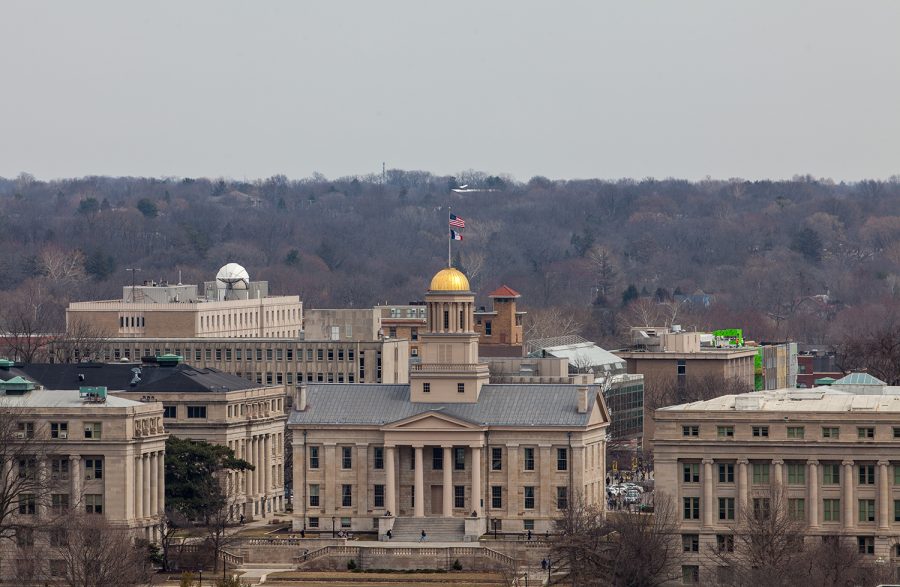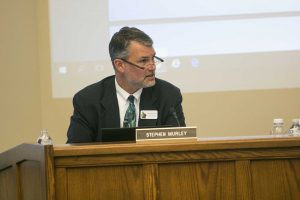Iowa scientists project dangerous heat levels in the near future
A group of 216 Iowa science professionals released the 2019 Iowa Climate Statement to detail the increasing concerns of extreme heat that will occur in the near future.
The Old Capital from the roof of UIHC in Iowa City, Iowa on March 25, 2019.
October 1, 2019
Model projections from the Iowa Climate Statement’s ninth annual release indicate that state residents should expect extreme and dangerous heat events to become more extreme and severe in the near future.
Released on Sept. 18, the statement is signed by 216 science professionals from 28 different colleges and universities across Iowa, University of Iowa Professor in Civil and Environmental Engineering Jerald Schnoor said. Schnoor was an author and organizer of this year’s statement.
The model projections indicate extreme and – in some cases deadly – heat levels for Iowa’s future, he said.
“We’re already experiencing climate change,” Schnoor said. “And the purpose of the statement is to say that it’s going to get much worse unless we begin to act.”
Schnoor said Iowa has not seen an increase in “very hot” days above 90- or 100-degrees Fahrenheit until now.
Due to the humidity and moisture, it is difficult for heat levels to increase to dangerous levels, he said. However, the statement predicts that Iowa is “at the end of that rope” and should expect hotter conditions around the state, Schnoor said.
“The increase in humidity has mitigated and ameliorated very hot days of the nineties and hundreds,” he said. “But finally, as you add more and more heat to the atmosphere and to the system, you break through and you get increases.”
RELATED: Iowa City Global Climate Strike march demands climate action
Peter Thorne, UI professor and director of the Environmental Health Sciences Research Center, also worked as a collaborator on the 2019 statement. His role was to illustrate the impact heat events can have on the health of the public, Thorne said.
Deaths that result from heat stroke and other illnesses are preventable, he said, as long as mitigation against climate change is prioritized and disaster preparedness established.
Extreme heat will lead to higher levels of air pollution due to an increase in air conditioning of buildings and will displace people from their homes due to a lack of cooling, Thorne added. This will also lead to a burden on emergency medical systems and hospitals, he said.
Livestock and pets are at risk in these extreme heat exams as well, Schnoor continued, and new developments in caring for animals is necessary.
As an educator of occupational and environmental health, Thorne said he is well aware of these issues and the importance of informing others on how rising heat levels will affect public health through the 2019 statement.
“From my perspective, the importance of this is we have the endorsement of scientists from all over the state who can then educate their colleagues on how important the issue of climate change is,” he said.
RELATED: Global Climate Strike continues in Iowa City with an open letter to the UI’s President Bruce Harreld
UI Civil and Environmental Engineering Professor David Cwiertny also contributed to the public health aspects of the statement and said it is important to note the disproportionate impacts extreme weather events have on different groups of people, such as socially isolated and low-income individuals.
“Just focusing on impacts to humans and thinking about vulnerable populations … I think that’s one of the important messages,” he said. “There will be people affected [disproportionately].”
This year’s report read “only by dramatic reductions in greenhouse gas emissions within the next 10 to 15 years will these effects be lessened.” Schnoor said this can be accomplished through an increase in solar energy and individual action.
“We need to improve the grid and make a smart grid such that we can even begin to hook up electric vehicles into the grid for agriculture,” he said. “We need to figure out how we can store more carbon out of the atmosphere.”
One way in which individuals can really make an impact is to vote, both Thorne and Schnoor said.
“I tell my students, maybe the most important thing that they can possibly do is to vote,” Schnoor said. “Because we need leadership at the state and federal level that we haven’t had.”





